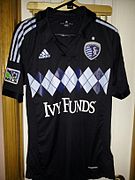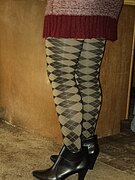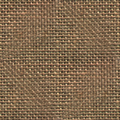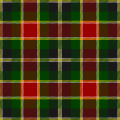Argyle (pattern)

An argyle (/ˈɑːr.ɡaɪl/, occasionally spelled argyll) pattern is made of diamonds or lozenges. The word is sometimes used to refer to an individual diamond in the design, but more commonly refers to the overall pattern. Most argyle contains layers of overlapping motifs, adding a sense of three-dimensionality, movement, and texture. Typically, there is an overlay of intercrossing diagonal lines on solid diamonds.
History[]
The argyle pattern derives from the tartan of Clan Campbell of Argyll in western Scotland,[1] used for kilts and plaids, and from the patterned socks worn by Scottish Highlanders since at least the 17th century (see illustrations in History of the kilt). These were generally known as "tartan hose".[2][3]
20th century[]
Argyle knitwear became fashionable in Great Britain and then in the United States after the First World War of 1914–1918. Pringle of Scotland popularised the design, helped by its identification with the Duke of Windsor.[4] Pringle's website says that "the iconic Pringle argyle design was developed" in the 1920s.[5] The Duke, like others, used this pattern for golf clothing: both for jerseys and for the long socks needed for the plus-fours trouser fashion of the day.
Contemporary use[]
Payne Stewart (1957–1999), who won the U.S. Open in 1991 and 1999 and the PGA championship in 1989, was known for his flashy tams, knickerbockers, and argyle socks.[6]
Some sports teams use bright, contemporary interpretations of the argyle pattern. For example, the Norwegian men's curling team at the 2010 Winter Olympics[7] and the Garmin-Slipstream professional cycling team, nicknamed the "Argyle Armada". On 27 April 2013 the professional soccer team Sporting Kansas City of Major League Soccer (MLS) in the United States announced their third kit of the 2013 season, featuring an argyle pattern.[8] The University of North Carolina has used the argyle pattern for its basketball uniforms since 1991, and introduced it as alternate for all sports uniforms in 2015.[9] The Belgian football team used such design in 1984, and had an updated version of it in 2018.
Knitting[]
As a knitting pattern, argyle is generally accomplished using the intarsia technique. Argyle patterns are occasionally woven.
Gallery[]

Argyle socks
Green argyle leggings

The 2013 3rd Jersey kit from Sporting Kansas City

Argyle sweater vest

Argyle kinesiology tape
See also[]
- Check (fabric)
- Flannel
- Harlequin print
- Houndstooth
- Madras (cloth)
References[]
- ^ Strehlow, Richard A.; Wright, Sue Ellen, eds. (1993). "Appendix: Terminology Update–Textiles at the English Language Hall of Fame". Standardizing terminology for better communication: practice, applied theory, and results. Ann Arbor, Michigan: ASTM. p. 341. ISBN 0803114931.
- ^ Cochrane, Andrew (1836) [Originally sent 4 January 1746]. "LVIII. Provost Cochrane to the Duke of Argyle". In Dennistoun, James (ed.). The Cochrane Correspondence Regarding the Affairs of Glasgow, M.DCC.XLV–VI. Glasgow. p. 64.
- ^ "Hose". Scottish Tartans Authority. Retrieved 20 February 2010.
- ^ Hodgkinson, Mark (15 July 2004). "Diamonds are for heather – and all parts of a golf course now Pringle's back". The Telegraph. London. Retrieved 25 April 2010.
- ^ "Our Story". Pringle of Scotland. Retrieved 20 February 2010.
- ^ Oppliger, Aaron J., ed. (2000). "Stewart, Payne (1957-1999)". Newsmakers 2000: The People Behind Todays Headlines. Detroit: Gale Group.
- ^ Bracken, Kassie (14 February 2010). "The Curling Lords of Argyle". The New York Times. Retrieved 4 March 2011.
- ^ Austin, Kurt (27 April 2013). "Sporting KC unveils third kit, presented by Ivy Funds". Kansas City Sporting. Major League Soccer. Retrieved 29 April 2013.
- ^ Newcomb, Tim (20 April 2015). "North Carolina football embraces argyle pattern in new uniforms". Sports Illustrated. TI Gotham Inc. Retrieved 18 December 2015.
External links[]
 The dictionary definition of argyle at Wiktionary
The dictionary definition of argyle at Wiktionary
- Knitting ornaments
- Scottish culture
- Textile patterns
- Scottish design
- Scottish clothing








